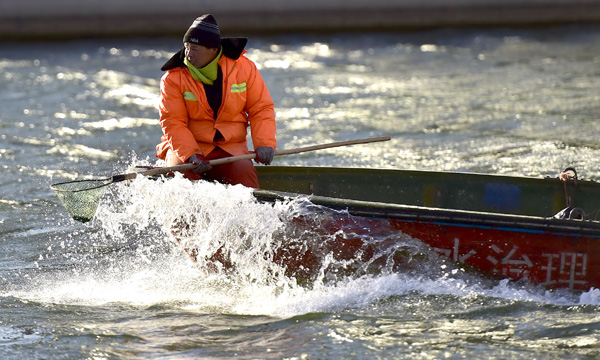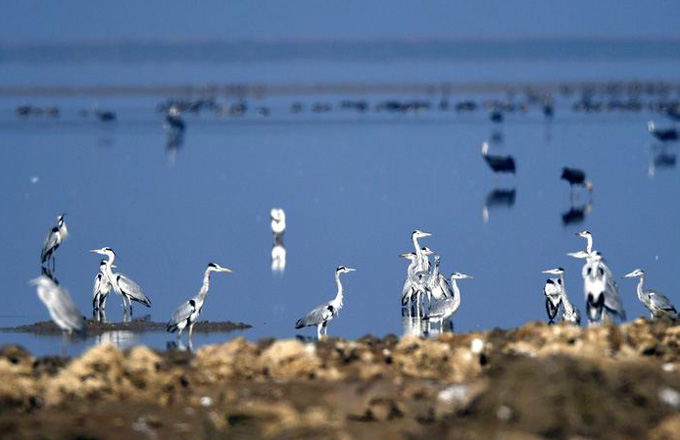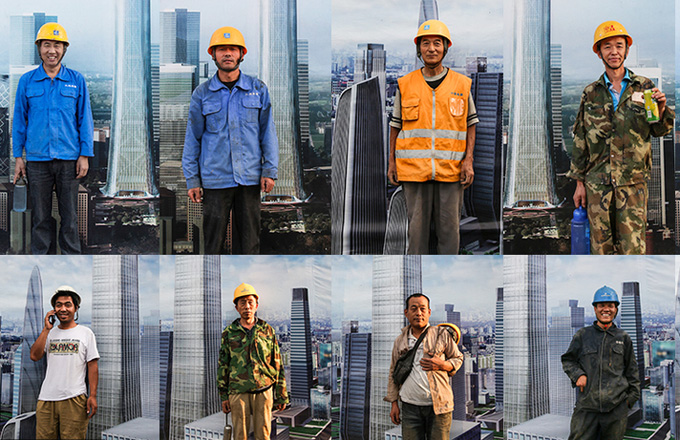Water quality to be prioritized
 |
|
A worker collects garbage in the Haihe River in Tianjin on Dec 8. [Photo/Xinhua] |
Better monitoring requires funding, plus technological and legal support
A draft amendment to the Water Pollution Prevention Law, submitted to the country's top legislative body for first reading on Monday, calls for more restrictions on major sources of underground water pollution, such as chemical plants, industrial zones, mining regions and waste burial sites.
Such sources of pollution should take extra measures to prevent leakage that contaminates underground water, the draft states.
Control of underground water pollution has received growing attention from governments and the public concerned about the safety of drinking water.
Among the 5,118 subterranean monitoring stations across 202 cities nationwide, 18.8 percent reported water quality in the bottom tier of the five-tier national water quality system last year, according to the annual bulletin on environmental quality from the Ministry of Environmental Protection.
It will be lowered to 15 percent by 2020 and the authorities will improve monitoring, with broader coverage and better technology, it said.
Tightened control of underground water is necessary and requires greater support of technology, funding, and laws and regulations, said Xi Beidou, a researcher at the Chinese Research Academy of Environmental Sciences.
Xi led a team of experts in conducting surveys on underground water pollution and provided suggestions for governments.
In addition, the draft amendment stipulates that governments should shoulder larger responsibilities and report plans for water quality improvement to higher levels of governments, as well as making such plans public, to receive wider supervision.
The draft improves the protection of drinking water, stating that emergency responses and backup water sources should be built in cities with single water sources, and the quality of drinking water should be heavily monitored, with relevant information made public.
Water pollution prevention in key fields, including industrial sewage, agriculture and rural areas, as well as pollution from ships, should be tightened, according to the draft.
The current Water Pollution Prevention Law was enacted in 1984, and amended in 1996 and 2008, and has played an important role in curbing water pollution, said Chen Jining, minister of environmental protection, at the opening meeting of the bimonthly session of the top legislature.
During the 12th Five-Year Plan (2011-15), China's chemical oxygen demand, a measure of organic pollutants in water, dropped by 12.9 percent, while emissions of ammoniacal nitrogen shrank 13 percent, exceeding expectations.
In addition, in the first nine months, among the 1,922 monitoring stations for surface water quality nationwide, 72.3 percent of monitored sections were in the top three levels, meaning that the water could be used for drinking, irrigation or industrial use, the ministry said.
Only 8.6 percent were in the "severely polluted" level, meaning that the water could not be used for any purpose, it added.
However, Chen said on Monday that China still has severe problems with water pollution.
The draft was made to ensure better implementation of a water pollution prevention plan issued by the State Council in April last year, the minister said.
























